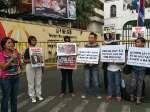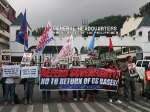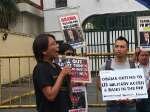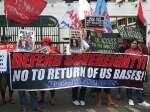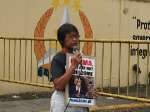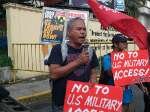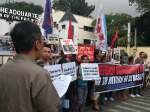Paninindigan January 2010
EDITORIAL
On May 10, the Philippines will mark a significant day in its electoral history. For the first time, the national elections long beset by credibility and integrity issues will use a fully automated system. By employing modern technology in the counting, transmission, and canvassing of votes, poll officials hope to reduce “human intervention” that influences election results. The Commission on Elections (Comelec) also promises an electoral process “unprecedented in rapidity”, with all winners declared within 36 hours.
To be sure, maximizing the benefits of modern technology to reduce the likelihood of electoral fraud is a track that must be pursued. The problems confronting elections in the country however require more than a technological fix. It must be pointed out that automation is being carried out under a much discredited, corrupt and brutally violent US-Arroyo regime and a Comelec that has little credibility after the 2004 “Hello Garci” expose that unmasked a cheating mafia inside the poll body.
Recent developments in the political arena and Comelec’s bungled automation efforts continue to fan public skepticism about the May 10 polls. The hope of some that at least the elections will signal the end of the despised nine-year old administration quickly dissipated when Gloria Arroyo filed her candidacy for Congress in Pampanga’s second district. One scheme for a “Gloria Forever” scenario suddenly became a very real threat with Arroyo capturing either the Speakership of the House of Representatives or the Prime Minister post through Charter Change or simply wielding a sizeable bloc in the House to thwart any moves to make her and her regime accountable for countless crimes.
The Arroyo clique is determined to stay in power beyond June 30th, Arroyo’s last day in office and it is scheming different options to do so. Failure of elections remains a distinct possibility reinforced by the many delays and glitches as well as anomalies and lack of Comelec transparency that have marked the automated election system (AES) from the signing of the contract to the conduct of field tests and mock polls. With May 10 elections nearing, public distrust on the automation technology (i.e. precinct count optical scan or PCOS) chosen by Comelec remains widespread. Meanwhile, the one-week imposition of Martial Law in Maguindanao following the Ampatuan massacre last November 23, 2009 is widely perceived as a dry-run for similar declarations in other parts of the country to derail the elections. The clear intent of Malacanang to select the next Supreme Court (SC) Chief Justice despite an expressed Constitutional prohibition on this and to consolidate its hold over the Armed Forces of the Philippines (AFP) via the appointment of an Arroyo loyalist whom previously headed the Presidential Security Group are also meant to guarantee maximum leverage for the Arroyo clique in these institutions.
Attacks on the people’s democratic movement, the staunchest opponent of the anti-people and pro-imperialist US-Arroyo regime are being scaled up as the May 10 elections draw near. This must be seen squarely within the framework of the overall scheme to perpetuate Mrs. Arroyo in power. The arrest of 43 health workers, including two doctors, a nurse, and a midwife, last February 6 while conducting a health training-seminar in Morong, Rizal is just the latest proof of escalating state terrorism. Oplan Bantay Laya (OBL) I and II, the US-Arroyo regime’s counter-insurgency programs which grandiosely aimed to end the communist-led armed struggle in the countryside by terrorizing its base of support among the peasantry and assassinating or arresting alleged supporters in the urban areas have failed to achieve its 2010 deadline. Nevertheless, the US-Arroyo regime intends to frustrate the renewed foray of progressive candidates into the electoral arena which has been markedly successful as seen by the increasing number of seats they have captured through the partylist system since 2001.
US imperialism has been closely following these developments in the Philippines leading to the May 10 automated polls. On the one hand, it is in the interest of the US that the elections achieve an acceptable degree of “credibility” and would prefer a smooth transfer of political power to provide legitimacy to the would be President and most likely next US puppet. On the other hand, it strongly supports the political repression of the people’s democratic movement, which has been firmly anti-imperialist, to prevent it from gaining ground through, among others, greater electoral victories. It is also likely that the Arroyo clique has powerful backers within the US corridors of power for its continuing efforts to hold on to power beyond 2010 through Cha-cha since Cha-cha itself will promote US interests and has long been in its agenda, and also since Arroyo has proven to be a very reliable ally and champion of US’s imperialist interests in the Philippines.
It is important and necessary to arouse, organize and mobilize the people to expose and oppose election fraud. The objective is not to legitimize the next regime or to foist illusions about elections as a so-called democratic exercise but in order to push the limits of the limited space provided by the elections to advance the people’s nationalist and democratic demands. It means not only helping ensure the victory of progressive party list groups and allies who commit to carry out political and socio-economic reforms in response to the people’s issues. More importantly, it means making the most of the opportunity provided by the elections to reach out to more people, educate them about the deep-seated social problems confronting the country, and mobilize them in the struggle for national freedom and genuine democracy beyond the May 10 elections.
For these reasons, Bayan supports the broad campaign Kontra Daya as a poll watchdog and anti-fraud network of various groups and individuals interested to make the elections, to the extent possible, clean, honest, and free. Pagbabago! People’s Movement for Change is also active in the electoral arena by popularizing the “People’s Criteria”, a set of 12 questions that can assess current candidates vis-à-vis the most pressing political, economic, and social issues that affect the people. These engagements during the elections go side-by-side with Bayan’s core mandate as the center for mass campaigns and alliances working against high prices, low wages, lack of jobs and social services, landlessness and land grabbing in the countryside, militarization and human rights violations, unfair international agreements, US political interference and military interventionism, corruption and abuses in government, etc.
We do not harbor the illusion that the elections by themselves can bring about the fundamental changes that the Philippines need to become truly democratic, sovereign, and prosperous. The absence of genuine land reform and national industrialization, and the presence of continued US domination will not be addressed by the simple transfer of power from one faction of the ruling elite to another. Our struggle is thus waged during and beyond the May 10 elections. ###

